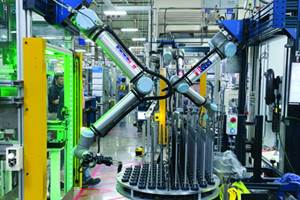Why Estate Plans Often Flunk The Real-Life Test
I recently saw a company advertise installation of 90 percent of what it sells. This gives a company an edge over its competitor, where the routine is, if the product doesn't work, the manufacturer blames it on the installer, and the installer blames it on the manufacturer.
Share


Hwacheon Machinery America, Inc.
Featured Content
View More


.png;maxWidth=45)
DMG MORI - Cincinnati
Featured Content
View More


I recently saw a company advertise installation of 90 percent of what it sells. This gives a company an edge over its competitor, where the routine is, if the product doesn't work, the manufacturer blames it on the installer, and the installer blames it on the manufacturer. Then after some grief and more money, it works.
Now there's a game you don't want to play with your estate plan. Try this real-life tax disaster.
Joe died, survived by his wife Mary, three grown kids (one managed Joe's family business, Success Co.) and seven grandchildren. Success Co. was a C corporation. Aside from owning their residence (worth $600,000) and Success Co. (valued at $9.2 million at Joe's death), Joe and Mary had $325,000 of spendable wealth. They also owned various property and a nice summer home with a total value of more than $1 million.
About five years before he died Joe had gathered a team of professionals to do his estate plan: His CPA, a lawyer who specialized in estate planning and his long-time friend, an insurance agent.
The professionals crafted a good traditional estate plan: no tax due at Joe's death (the marital deduction) and enough insurance (second-to-die) to pay the projected estate tax at Mary's death. An irrevocable life insurance trust owned the second-to-die policy on Joe's and Mary's lives. The estate plan probably would get an A+ in the classroom.
But here's the unfortunate little lifetime detail the professional team missed: Mary, a healthy age 64, did not have a flow of income to maintain her lifestyle. Joe's $500,000 salary plus generous perks from Success Co. stopped with his death. Aside from the usual lifestyle cash needs, Mary needed $46,000 per year to pay the second-to-die insurance premium. Also, she wanted to continue providing for the college education of four of her grandchildren.
None of the professionals accepted responsibility for Mary's lack of spendable income. Worse yet, they had no suggestions to solve the problem.
First, the solution to Mary's immediate problem: The marital trust (created in Joe's revocable trust as part of his estate plan) owned 90 percent of Success Co. (Mary owned the other 10 percent). We simply had the stockholders (the marital trust and Mary) elect S Corporation status for Success Co. The large corporate profit will provide the income stream she needs as the beneficiary of the marital trust (90 percent) and as a direct owner (10 percent).
Now, what lesson should be learned from this sad tale? The first lesson is that estate planning (as practiced all over the United States) is really death planning. Prepare the documents—a will and a trust or two, put them in the vault and wait to die.
Rather than rehash what should have been done for Joe and Mary, let's get the first lesson up on the board . . . loud and clear. Whether you call it estate planning, lifetime planning, wealth transfer planning or whatever, your master plan must include three separate plans: (1) a lifetime plan to transfer your wealth while you are alive (and, yes you can control your wealth for as long as you live); (2) a retirement plan that provides the after-tax cash flow needed to maintain your lifestyle for you (and your spouse) for as long as you live; and (3) a transfer/succession plan for your business.
If you have yet to do your master plan, make sure it includes the three plans listed above. If your master plan is done and does not include all three of the plans listed above, get a second opinion. And finally, make sure that the professionals who create your plan know in advance that they are responsible for all aspects: they who create the plan should install it and monitor it til the day you (and your spouse) die.
Related Content
6 Variations That Kill Productivity
The act of qualifying CNC programs is largely related to eliminating variations, which can be a daunting task when you consider how many things can change from one time a job is run to the next.
Read MoreRethink Quality Control to Increase Productivity, Decrease Scrap
Verifying parts is essential to documenting quality, and there are a few best practices that can make the quality control process more efficient.
Read More4 Steps to a Cobot Culture: How Thyssenkrupp Bilstein Has Answered Staffing Shortages With Economical Automation
Safe, economical automation using collaborative robots can transform a manufacturing facility and overcome staffing shortfalls, but it takes additional investment and a systemized approach to automation in order to realize this change.
Read MoreTips for Designing CNC Programs That Help Operators
The way a G-code program is formatted directly affects the productivity of the CNC people who use them. Design CNC programs that make CNC setup people and operators’ jobs easier.
Read MoreRead Next
5 Rules of Thumb for Buying CNC Machine Tools
Use these tips to carefully plan your machine tool purchases and to avoid regretting your decision later.
Read MoreBuilding Out a Foundation for Student Machinists
Autodesk and Haas have teamed up to produce an introductory course for students that covers the basics of CAD, CAM and CNC while providing them with a portfolio part.
Read MoreRegistration Now Open for the Precision Machining Technology Show (PMTS) 2025
The precision machining industry’s premier event returns to Cleveland, OH, April 1-3.
Read More



























.png;maxWidth=300;quality=90)






.jpg;maxWidth=300;quality=90)









